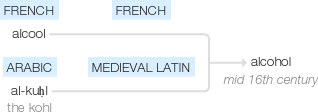Alcohol
mid 16th century: French (earlier form of alcool ), or from medieval Latin, from Arabic al-kuḥl ‘the kohl’. In early use the term referred to powders, specifically kohl, and especially those obtained by sublimation; later ‘a distilled or rectified spirit’ (mid 17th century).
wiktionary
Entered in the early 15th c. from Middle English alcofol, from Middle French alcohol or Spanish alcohol, derived from the Medieval Latin rendering alcohol transmitted in medical or alchemical literature of Arabic اَلْكُحْل (al-kuḥl, “ kohl”), which in Andalusian Arabic also bore the form كُحُول (kuḥūl), قُحُول (quḥūl); bearing thus the meaning of stibnite first, then generalized in meaning to a powder obtained by triturating a material, then also to liquids obtained by boiling down, and specialized to mean spirit of wine, ethanol, in the 18th century, then the narrow chemical sense after 1850.
etymonline
alcohol (n.)
1540s (early 15c. as alcofol), "fine powder produced by sublimation," from Medieval Latin alcohol "powdered ore of antimony," from Arabic al-kuhul "kohl," the fine metallic powder used to darken the eyelids, from kahala "to stain, paint." The al- is the Arabic definite article, "the."
Paracelsus (1493-1541) used the word to refer to a fine powder but also a volatile liquid. By 1670s it was being used in English for "any sublimated substance, the pure spirit of anything," including liquids.
The sense of "intoxicating ingredient in strong liquor" is attested by 1753, short for alcohol of wine, which then was extended to "the intoxicating element in fermented liquors." The formerly preferred terms for the substance were rectified spirits or brandy.
In organic chemistry, the word was extended by 1808 to the class of compounds of the same type as this (a 1790 translation of Lavoisier's "Elements of Chemistry" has alkoholic gas for "the combination of alkohol with caloric").
